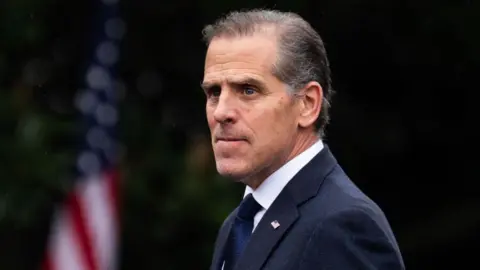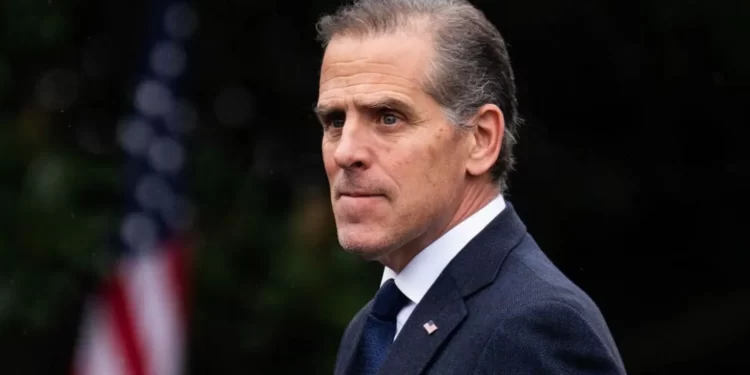 Getty Images
Getty ImagesJoe Biden had repeadely denied that he was going to pardon his son Hunter for his gun and tax evasion convictions or commute what was shaping up to be a substantive prison sentence.
On the Sunday evening after Thanksgiving – at a moment when the American public’s attention was decidedly elsewhere – he announced he had changed his mind.
“There has been an effort to break Hunter – who has been five and a half years sober, even in the face of unrelenting attacks and selective prosecution,” he wrote in a press statement announcing his decision. “In trying to break Hunter, they’ve tried to break me – and there’s no reason to believe it will stop here. Enough is enough.”
Biden’s move has already prompted furious claims of hypocrisy from Republicans – for breaking his promise and for using his presidential power to protect his son. One Democratic governor, Jared Polis of Colorado, quickly released a statement saying he was “disappointed” and that the move would “tarnish” the outgoing president’s reputation.
Watch: From charge to pardon – how did we get here?
Presidents have pardoned family members in the past. In 2001, Bill Clinton issued clemency for his brother Roger’s 1985 drug conviction. Hunter Biden’s “full and unconditional” pardon was particularly broad, however. It covers his criminal convictions, as well as any future charges for “offenses against the United States” from the start of 2014 to this Sunday.
That time period includes two years that Hunter Biden served on the board of Ukrainian energy company Burisma and was involved in other international dealings while his father served as vice-president. Republicans have alleged that Hunter Biden had improperly benefitted from his father’s position of power and that the elder Biden had been connected to his son’s business dealings.
The president’s explanation for the pardon might sound familiar to anyone who has listened to Donald Trump rail against America’s system of justice in recent years.
Trump, as he exited the White House in 2021, issued a series of pardons for his close associates and allies who had been swept up in the multiple criminal investigations that encircled him throughout his presidential term. In doing so, he bypassed established White House procedures for exercising the broad presidential pardon power. And although he was criticised for the action at the time, there were little if any political consequences.
Last week, in fact, Trump announced that he was nominating one of his 2021 pardon recipients – Charles Kushner, the father of his son-in-law Jared Kushner – to be US ambassador to France. Kushner had been convicted of campaign finance violations, tax evasion and witness tampering in 2005 and served two years in prison.
Presidential pardons fundamentally altered
With Biden’s political career drawing to a close, however, there is little price he could pay for his action. And given that Democrats lost power in both Congress and the White House last month, there are few members of the party in a position of power to face the consequences.
If Vice-President Kamala Harris had won, her presidential transition would have been derailed at least temporarily, as she would have been pressed to condemn Biden’s move. It may have made such a sweeping act by Biden less likely. Instead, the national attention will quickly shift back to the incoming Trump presidency.
The rules governing presidential pardoning – or at the very least the processes and established guardrails that had guided its use – appear to have been fundamentally and permanently altered. At this point there may be scarce grounds for anyone to complain, no matter on which side of the political aisle they stand.
The Trump camp was quick to issue a response to the news of the Biden pardon, saying that the president-elect would fix the US justice system and restore due process in his second term.
It’s something to keep in mind when Trump returns to office, as he is expected to again use his pardoning power to aid associates who have been prosecuted during the Biden presidency – and to free many of his supporters who have been convicted during the 6 January 2021 assault on the US Capitol.
Trump mentioned the 6 January cases when criticising the Hunter Biden pardon, and he is likely to cite the president’s action when he issues his own round of pardons next year.
Both sides will continue to accuse the other of partisan prosecutions and governing as though they are above the law. An American public that polls suggest already is sceptical of ethics in government may now be even more convinced that both sides share the blame.







